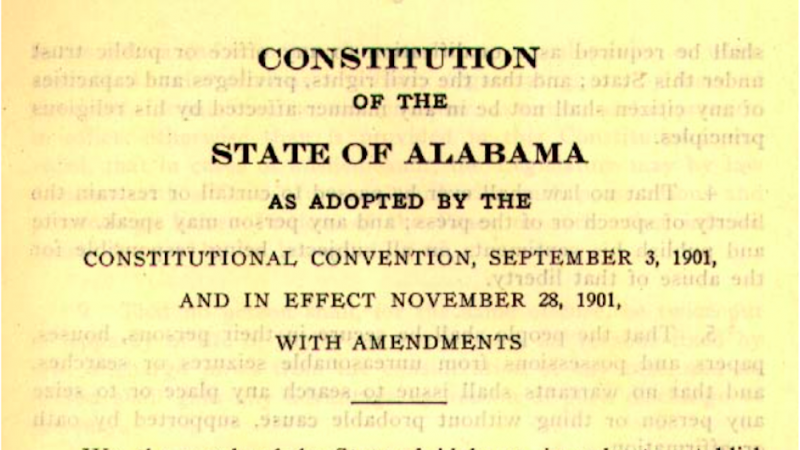Alabama Moves One Step Closer To Removing Racist Language From State Constitution
Alabama voters this year have the opportunity to reorganize the state’s Constitution, as well as remove racist language from the document.
The passage of a statewide ballot measure to purge racist language from the Alabama Constitution marks an important step in what could be a long process.
Amendment 4 passed with almost 67% of the vote in Tuesday’s election. One of six constitutional amendments on the state ballot this November, the measure authorizes lawmakers to recompile the Alabama Constitution and submit it during the 2022 legislative session.
Alabama’s Constitution is the longest in the world. Most of the original language has never been removed — it’s simply been nullified by later amendments or federal court orders. The state constitution still includes language that segregates schools and bans interracial marraige.
Amendment 4 was sponsored by Democratic state Rep. Merika Coleman and co-sponsored by Republican House Speaker Mac McCutcheon. It passed both houses of the Alabama State Legislature unanimously.
Similar amendments in 2004 and 2012 failed to win majority support from Alabama voters. The primary disagreement was over constitutional Amendment 111, which declares that the state does not guarantee “any right to education or training at public expense.” For years, Democratic lawmakers have wanted this language removed, but Republicans feared that such a move would disrupt private education. This year, legislators decided to leave this issue alone, a choice that boosted the amendment’s chances of passage.
“The support of a variety of progressive and even conservative groups on both sides of the spectrum provided some comfort to voters who may have been concerned about changing the state’s constitution,” said Randolph Horn, a Samford political science professor.
It will take years to revise the Alabama Constitution. Amendment 4’s passage was just an initial step in what will be a cumbersome process. The Legislative Reference Service will now draft changes to the state constitution. Those changes will go before the Legislature in 2022. If the legislature approves the proposed changes, voters will then have to vote on the new constitution, perhaps in the 2022 general election.
U.S. gave Ukraine and Russia June deadline to reach peace agreement, Zelenskyy says
"The Americans are proposing the parties end the war by the beginning of this summer," Zelenskyy said, speaking to reporters on Friday.
U.K. leader’s chief of staff quits over hiring of Epstein friend as U.S. ambassador
British Prime Minister Keir Starmer's chief of staff resigned Sunday over the furor surrounding the appointment of Peter Mandelson as U.K. ambassador to the U.S. despite his ties to Jeffrey Epstein.
Trump administration lauds plastic surgeons’ statement on trans surgery for minors
A patient who came to regret the top surgery she got as a teen won a $2 million malpractice suit. Then, the American Society of Plastic Surgeons clarified its position that surgery is not recommended for transgender minors.
What you should know about Bad Bunny’s Super Bowl halftime show
Will the Puerto Rican superstar bring out any special guests? Will there be controversy? Here's what you should know about what could be the most significant concert of the year.
Sunday Puzzle: -IUM Pandemonium
NPR's Ayesha Rascoe plays the puzzle with KPBS listener Anthony Baio and Weekend Edition Puzzlemaster Will Shortz.
Thailand counts votes in early election with 3 main parties vying for power
Vote counting was underway in Thailand's early general election on Sunday, seen as a three-way race among competing visions of progressive, populist and old-fashioned patronage politics.








